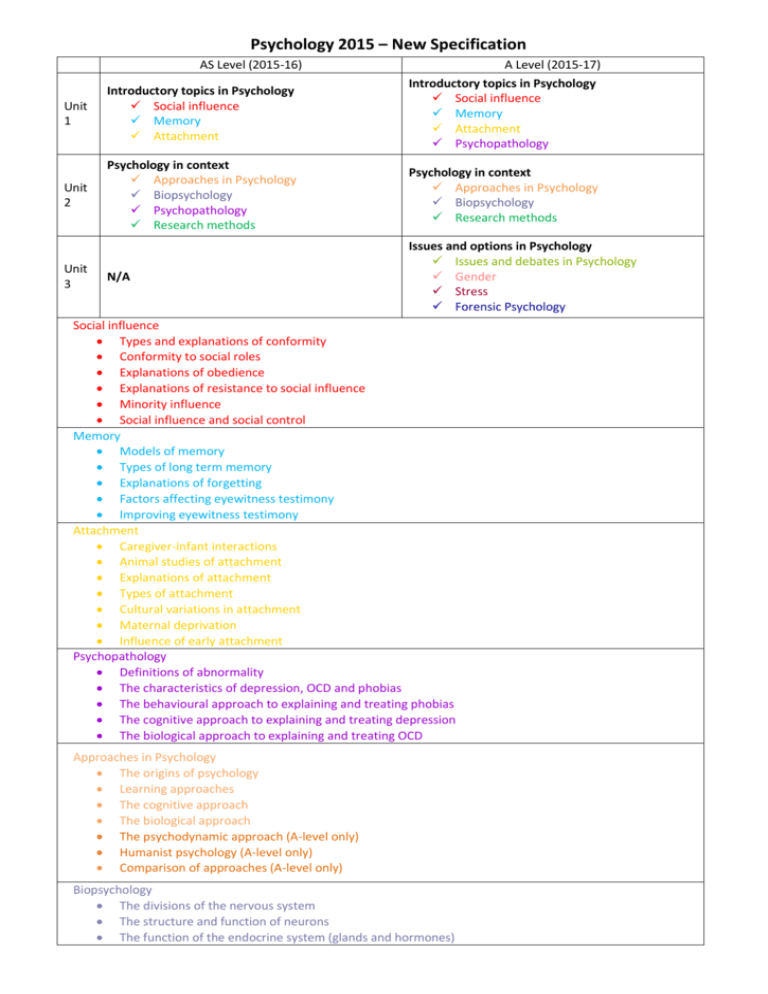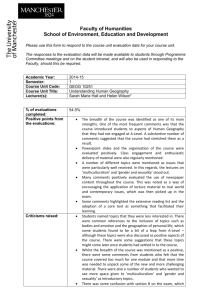Psychology 2015 – topic details
advertisement

Psychology 2015 – New Specification AS Level (2015-16) A Level (2015-17) Introductory topics in Psychology Social influence Memory Attachment Psychopathology Unit 1 Introductory topics in Psychology Social influence Memory Attachment Unit 2 Psychology in context Approaches in Psychology Biopsychology Psychopathology Research methods Psychology in context Approaches in Psychology Biopsychology Research methods N/A Issues and options in Psychology Issues and debates in Psychology Gender Stress Forensic Psychology Unit 3 Social influence Types and explanations of conformity Conformity to social roles Explanations of obedience Explanations of resistance to social influence Minority influence Social influence and social control Memory Models of memory Types of long term memory Explanations of forgetting Factors affecting eyewitness testimony Improving eyewitness testimony Attachment Caregiver-infant interactions Animal studies of attachment Explanations of attachment Types of attachment Cultural variations in attachment Maternal deprivation Influence of early attachment Psychopathology Definitions of abnormality The characteristics of depression, OCD and phobias The behavioural approach to explaining and treating phobias The cognitive approach to explaining and treating depression The biological approach to explaining and treating OCD Approaches in Psychology The origins of psychology Learning approaches The cognitive approach The biological approach The psychodynamic approach (A-level only) Humanist psychology (A-level only) Comparison of approaches (A-level only) Biopsychology The divisions of the nervous system The structure and function of neurons The function of the endocrine system (glands and hormones) The fight or flight response Localisation of function of the brain (A-level only) Ways of studying the brain (A-level only) Biological rhythms (A-level only) Research methods Knowledge, understanding, strengths and limitations of: Laboratory, field, natural and quasi-experiments Observational methods Questionnaires and interviews Correlational analysis Content analysis (A-level only) Case studies (A-level only) Scientific processes How psychological research is planned, designed and evaluated (More depth for full A-level) Ethics Features of science (A-level only) Reporting psychological investigations (A-level only) Data handling and analysis Types of data Descriptive statistics Use of graphs, tables etc. Distributions Levels of measurement (A-level only) Content analysis (A-level only) Correlations(A-level only) Inferential testing (A-level only) Probability and significance Type I and Type II errors Use of Spearman’s rho, Pearson’s r, Wilcoxon, Mann-Whitney, related t-test, unrelated t-test and ChiSquared test. Issues and debates in Psychology (A-level only) Gender and culture in psychology Free will and determinism The nature-nurture debate Holism and reductionism Idiographic and nomothetic approaches Ethical implications of research studies and theory Gender (A-level only) Sex and gender and sex-role stereotypes The role of chromosomes and hormones in sex and gender Cognitive explanations of gender development Psychodynamic explanation of gender development Social learning theory as applied to gender development Atypical gender development - gender identity disorder Stress (A-level only) The physiology of stress The role of stress in illness Sources of stress Measuring stress Individual differences in stress Managing and coping with stress Forensic Psychology (A-level only) Problems in defining crime and ways of measuring crime Offender profiling Biological explanations of offending behaviour Psychological explanations of offending behaviour Dealing with offending behaviour





